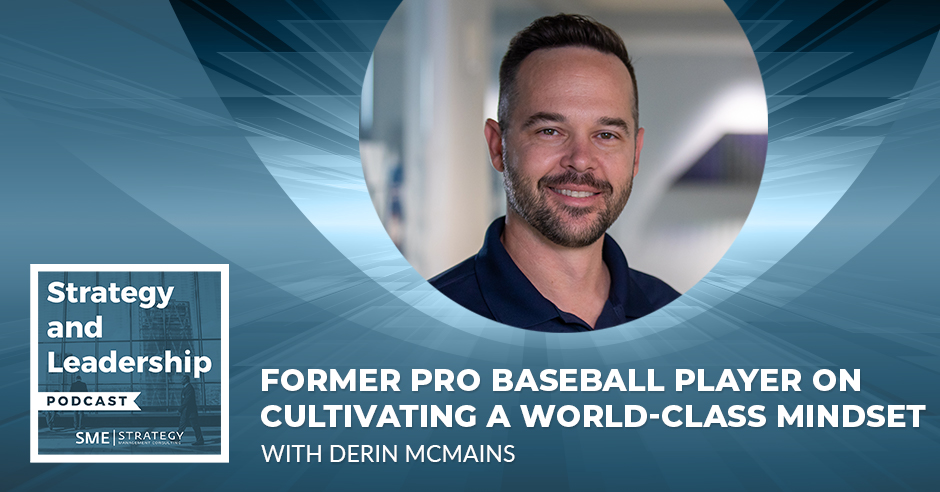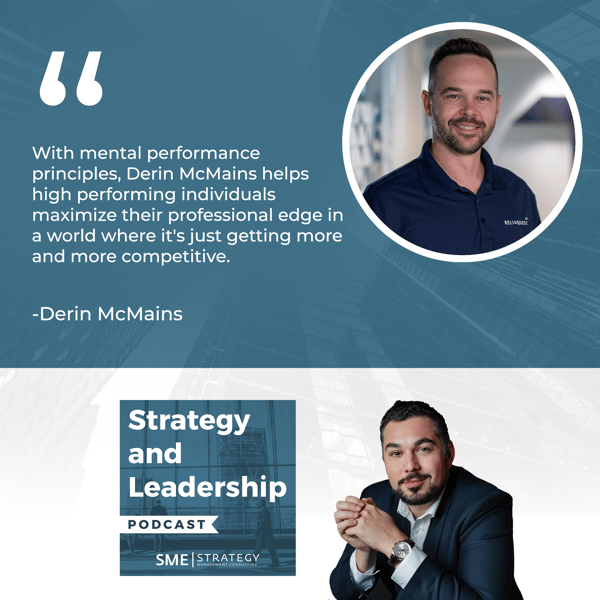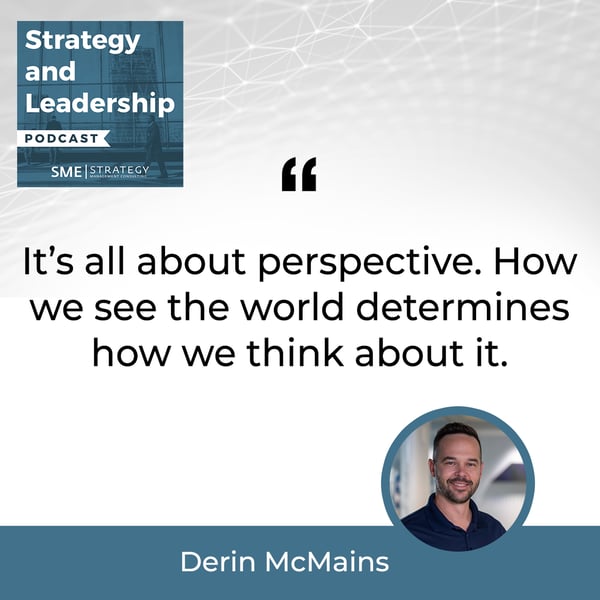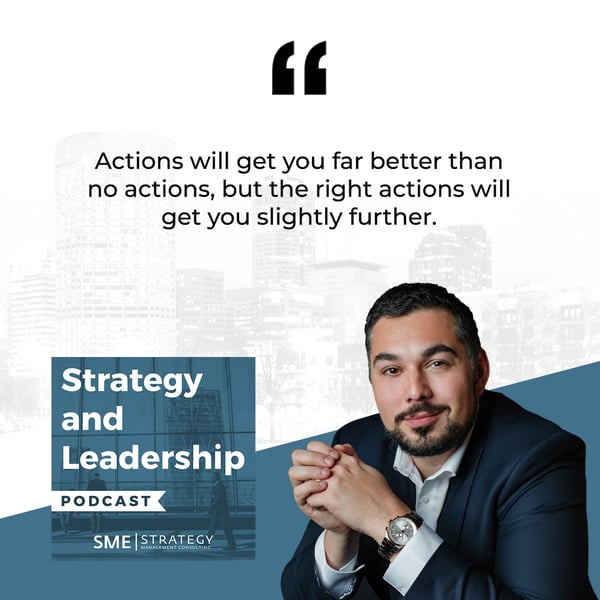Former Pro Baseball Player On Cultivating A World-Class Mindset With Derin McMains

Some of the best athletes out there understand that physical performance can only take you so far without having the right mindset to go with it. This same is true for our professional lives, especially in today’s competitive environment. In this episode, who better to help you cultivate a world-class mindset than a former pro baseball player himself? Derin McMains joins Anthony Taylor to talk about the importance of mindset and how you can translate it across all areas of your life. As the Director of Mental Performance at global security company, ReliaQuest, Derin has been training executives with mental performance principles to take their game to the next level. He shares some of those principles and gives us a peek into what a performance program looks like, diving deep into the value of being intentional, taking the right action, and preparation. Tune in to this conversation and learn what it takes to be a high performer and more!
Listen on Spotify: https://open.spotify.com/episode/634ZiIbJNACEiaciMuQiLw?si=33ff8b18a5d94411
Listen on Apple Podcasts: https://podcasts.apple.com/ca/podcast/former-pro-baseball-player-on-cultivating-a-world/id1202449526?i=1000633835230
---
Watch the episode here
Listen to the podcast here
Former Pro Baseball Player On Cultivating A World-Class Mindset With Derin McMains
In this episode, I'm joined by Derin McMains. He is a former professional baseball player turned Director of Mental Performance in ReliaQuest. He's worked with organizations like the Seattle Mariners, San Francisco Giants, and the Arizona Diamondbacks all around mental performance. I'm super excited to have him on the show to talk about how we can translate those skills into professional life. Derin, how's it going?
It’s going great. Thanks for the opportunity. I’m looking forward to this opportunity to share.
Honestly, it's my pleasure. I have a life goal of going to every major league ballpark. I'm at sixteen. I don't think that there is a sporting or physical feat harder than hitting a baseball. Add to that, you've got tens of thousands of screaming fans. I can't imagine what that was like as a career and going into it as a profession to say, “How can we help people build that mental toughness in those crunch-time situations?” As a layperson, it's incredibly fascinating, but why don't you tell our readers a little bit about your journey, how you got to hear, and the business that you're in, and I'll ask you some questions from there?
I have been a professional baseball player for seven seasons beginning in 2001. Because of injury, I retired in 2008 and then went into coaching and managing. I coached and managed professionally in the San Francisco Giants organization as well. It was during that time that I realized the importance and the value of mindset. As an athlete, I knew it, but I didn't engage in it because, at that time, thinking and focusing on sports psychology was more I felt, at least to that time, was for the weak. People who couldn't handle pressure.
I stayed away from it. When I started coaching and managing, it became more normalized. I realized there's real value in training your mind and you don't have to be sick to get better. How can we operate from a more proactive standpoint? From that, I went back to school. I got the degrees I needed to get and the education that I needed to get.

From that point, I rolled out the mental performance program with the Giants. I had a little pit stop at the University of Notre Dame to help them roll out their mental performance program there and, as you mentioned, with the Mariners, and now with the Arizona Diamondbacks. I'm consulting with them. It's funny you talked about hitting and the challenge of hitting. There's a four-step process when we think about mindset and what it takes to hit a fastball at the major league level.
It's this process, learn, control, plan, and commit. It's going to four steps. For me, you're always learning from what happened. Get control of yourself after that. Control of your emotions. It doesn't mean to suppress them. It means getting control of yourself, getting the space you need to get to, and then having a plan, like, “What's the plan going forward?” In this case, in baseball, be like, “I'm expecting a fastball.”
It's an all-out commitment. It’s going all in and selling out. It's like being willing to lose with plan A. Think about how that works in life. It's the same thing whether you're going into a presentation or meeting with a prospect or a customer. Learn and prepare. Get control of yourself, get the space you need to get to, what's your plan, then go for it. It's the same four steps.
I also consult now with some NFL players. It's funny I got to carry over those skills from baseball into working with football players. Thinking about it, they got 40 seconds between every play. It's the same thing, learn, control, plan, and commit. It's defining what those four steps are for you that any person can benefit from going forward.
Let's take it back. You are a professional ball player in your career. Congratulations, by the way. You then say, “Maybe there's something to this performance mindset.” What was one of the things that surprised you going through that journey? It is not just recognizing the importance of it, but as you understand the nuance of it, what was one of the couple of a-ha moments that surprised you along that way?
There's real value in training your mind. You don't have to be sick to get better.
The biggest thing that surprised me was how inputs become outputs. It is not being intentional in what I was reading, watching, and listening to. It is not realizing how those end up impacting, at the deepest level, our identity, but our perspective and our thoughts. It was during that time when I went, “I need to be more intentional about not watching the news. It is negative 24/7. If I'm going to listen to a show or listen to something like this, it's going to help me. It's going to pour something into me that might help me improve my work later.”
The biggest realization was how to be more intentional in controlling those inputs. I'll be more intentional in my outputs because most of us, myself included, it's like, “I can handle it. I can watch this. I can listen to this. This isn't going to impact me. I’m going to engage in the water cooler or negative talk. If I listen, this is not going to hurt me.”
Whereas realizing it is like, “If everything matters, then how can I be more intentional in those types of things?” The biggest one for me is what I call invisible anchors or invisible elevators, which are the people that you surround yourself with. You're going to take on essentially the thoughts and behaviors of probably the five people that you spend the most time with. Be intangible, like, “How do I cultivate these behaviors of people that I admire and respect the way they go about their business because those are the people who are going to pour into my life too.”
I take it back so I understand that the idea of inputs becoming your outputs contextually makes sense. I believe everybody has heard about that but in the context of high performance in mindset. What is the context or what is the frame? Is it related to how you view things? Is it in reference to your training? Is it in reference to your habits? Is it in reference to the learn and control thing that you talked about? Where do inputs become output? What bucket does that fall into in the context of a world-class mindset?
I always walk people through this this acronym IPTEA. We’ll work from the bottom up. A stands for Actions. It’s like, “Why did I do that thing? Why am I doing those actions?” I can tell you, let's work backward. You did that thing because you feel like it. It's our Emotions, influence, and action. That's the E, then you go, “Why do I feel in that certain way? Why was I having those emotions?” That goes to the T. That's our Thoughts. How we think determines how we feel and how we feel influences what we do.
The next question was like, “Why the heck was I thinking that thing? Why was I having those particular thoughts?” That goes to the P, that Perspective. Our perspective, how we see the world, determines how we think about it. How we think about determines how we feel and how we feel influences what we do. The last question is, “Why the heck do I see the world that way? Why is my perspective that way?” That goes to our Identity. That's the I.

How I see myself determines how I see the world, and then it goes through thoughts, emotions, and actions. The reason I share that, specifically in this context, is because when you think about all the stuff you're reading, listening, and watching. You're pouring into either your identity or your perspective. It's going to start to shape your world and shape situations in moments.
With that being said, it is the intentionality around how you want to see this thing. Being a high performer is a trained skill. It's not some people are born with it and some aren’t. If you go into a moment and “choke” or don't perform well, it's like, “How did you do that situation?” I viewed it as if I didn't get this deal or lock this thing down, then I was done.
Let's get back, are you done? You start unpacking those layers then you start to help people reframe certain situations that are going to impact your thoughts, emotions, and ultimate actions. That's what I'm talking about when you think about inputs because we're always feeding into that identity and perspective piece. When you think about how it all comes out in the end, thoughts, emotions, and actions, that's how it tends to come out.
I'm a visual learner, so in the back of my head, I'm like, “What makes somebody become a professional athlete?” There are professional athletes and good professional athletes. In my brain, it occurs as a cycle of the mental game and then the performance because you have to be like a kid who's like, “I want to be a good thing,” so you have the IPTEA, then you're like cycle then cycle, mental game and then performance. Does that resonate with how you learned it?
That was one of the benefits of being a professional athlete first. As I was going through school and learning these things, I was like, “That makes sense.” I was able to put words around things that I may have experienced but didn't quite know how to articulate. This is the crazy part. I tell people this all the time. You don't have to be confident to perform well. You don't even have to view that situation in the “right optimal state” to perform well. You just have to do the thing.
I give this example. I remember there was a friend of mine who was trying out for a cheerleading squad like a college dance. She knew she wasn't going to make it. She's like, “I'm not good enough. There's no way I'm going to make this.” She goes, does it, and makes the team, then it's like, “Does confidence matter?” It's like, “I guess not.” Don't get me wrong, it's nice, but what I learned along the way is we think about that cycle. Some people get hung up because they're like, “I don't believe I can do it.” That's okay. Go for it.
It's like, “I'm not confident.” Don't get hung up on a feeling. Get focused on the action. That cycle goes either way because if I don't see myself as someone who can do it, but then I end up doing it, now the action goes the other way because maybe I am someone who can do that. It's so interesting, and that's why it's so ethereal at times, but that's why I love coaching so much. There is no blanket, like, “This is how you do it. Go for it.”
Everybody needs a coach. It helps a lot of us. I say this all the time, “You're the expert of yourself. You know what you need to do.” Sometimes we got to get it out of our heads and out in front of us. You talked about being a visual learner. Get it out of my head and get in front of me so I can look at it, I can unpack it, and then I can see what's helpful and operate on that. I can throw away the rest of it. That's how I see it, but I loved your picture of it. It gets very gray and ethereal when you start thinking about what you need and what don't need. That's why everybody's individual and that's why they need a coach.
We talk 98% of success is showing up. You got to show up and do the thing. In the context of strategic planning, which is our domain, people think, “It's just a bunch of actions.” Actions will get you far better than no actions, but the right actions will get you slightly further. That's the actual whatever those modifications are. In order to be able to do that, you need to see outside of yourself. It's fascinating.

There's the mental game, the physical game, and how the mental game can take you out of the physical game more than anything. Before going around in circular logic, I had a question. What's it like going to one of these organizations? Every organization is different, and every person knows their business or situation. Without giving any secret sauce away, what does a typical performance program look like? How do you get people to maximize their professional edge in an area in the world where it's getting more competitive?
First and foremost, leadership has to be bought in. Those that are at the top have to be bought into what you're doing because it is new. When you're rolling out any program, in the world of sports, the head coach, the general manager, in any business, if the CEO or the people that are in charge are not into it and see the value of it, good luck. That's what I first say. I was thinking about any program, which is the four steps that go into it.
First, there's the awareness phase where it's like, “What is this? I don't even know what this is and why it matters to me.” It's all around creating awareness. Awareness happens through consistency and simplicity, like being consistent with simple messages. The simplest way I would say it is how you think impacts how you feel, and how you feel influences how you perform. How can we think a little better? People would go, “I can see that.”
After you start to gain awareness, then there's the adoption phase. You start creating strategies on how you can help people adopt these things so they can make them more consistent in their lives, whether it's in team meetings, like, “Here are some adoption strategies that you can make more consistent.” It's not just one person, myself, or another mental performance coach or performance program leading it. It's now being adopted by leaders and individual teams.
That's what goes to phase three, which is ownership when they begin to own it. They start coming back to the performance person or the performance coach, saying, “Here's what I was thinking. Do you know what our team might need now?” They're coming to you with ideas. Now you get that relationship going back and forth.
What happens is when leaders and each individual stay own it and they start sharing it with their teammates, their individual contributors or teammates are going through the same process. They're getting their awareness raised. They're now adopting these strategies and ownership. That leads to the fourth and final stage, which I'd say is expansion.
It's flat-out expand like how do we make it as good as it can be where as many people as you can own this approach to performance where they know their mindset matters. For me, what I've seen over and over again is when the magic happens. It’s when you get the ownership at the individual level and it turns into expansion where it shows up in everything that you do and it's the way you operate.
Magic happens when you get the ownership at the individual level and it turns into an expansion, where it shows up in everything you do and the way you operate.
Awareness, adoption, ownership, and expansion align when we see strategic plans and people creating a vision. The vision is not a thing. The vision is a mindset, a possibility, or whatever you're trying to accomplish and people have to put themselves in the right contextual place and be like, “Are we the people that can do it? Do we see it as possible? What are the thoughts that are going into our heads as we do that? How do we feel about it?” and show up and make it happen. I see a lot of driving forward a strategic plan and organizational visual cultural change. It all sounds similar pieces. Anything else you want to share about that?
It's great. It’s interesting how they all line up. There are phases and, historically, there are reasons why things work. There's a process and strategy to it. There's always intentionality. It's Vince Lombardi who said, “The man on top of the mountain didn’t fall there.” There is intent behind everything that you do.
As we finish up, I'd love to ask you this. Is there one either mantra or what you do to get yourself calm and ready? Let's say you're going into a speech or a meeting. You're like, “I need to get my brain and my mind right.” What do you recommend to people as a quick and easy way of gaining their mental focus and mental clarity? Is there something that you recommend to people to get them in the zone?
People aren’t probably going to love this, but first and foremost is preparation. If you're not prepared, that voice of self-doubt is going to get loud when you step into the batter's box or the meeting. This is me learning coming over into the business space. What I've learned is you got to protect the time before your most important meetings to give yourself an opportunity to prepare.
I see a lot of leaders and executives fill up their calendars one meeting after the next. It's like, “Sure, if that's what she got to do. I understand you got to be a lot of different places.” I would make sure to protect that time before those most important meetings to write in the preparation on your calendar. That's what I would say, get to that space. When you think about the importance of mantras, this simple thing that you can tell yourself by going into any environment, I would say first, it’s got to be personal. It can't be like, “I read this on a wall so I'm going to use it.” It's got to be precise, personal precise too. Precise meaning of as few words as possible. If you're going to reside an eighteen-word thing when your emotions are running high and you're excited, good luck. Try to keep it as precise as possible.
The last thing I would say is it's got to be positive. This means forward focus. It doesn't always mean everything's going to be great. Maybe that's what you need. I don't know, but I say positive for forward focus. Meaning it's not about what you don't want to happen. It’s about what you do want to happen. Our brain doesn't understand the word don't. If I say, “Anthony, don't think about that pink zebra,” guess what? You and all the readers are thinking about the pink zebra, even though I said don't. Anyway, it's about personal, precise, and positive mantra that is specific to you. Whatever that means for somebody, that's what I have them think about going into it.
A couple of things I want to highlight is this performance culture of doing. What I heard is it's preparation, but sometimes preparation is doing nothing. Just being in the place to be prepared. I love mantras. Proper preparation prevents poor performance. If you show up to a meeting unprepared, you start crapping on people around you and blame other people where you're deflecting what you should blame on yourself.
When I was a goalie, not at a high level, the thing I would always say is like, “Good position, good decisions.” That would ground me to be like, “I don't need to worry about stopping the ball. I need to make sure I'm in a good position.” Whatever works for you, have something and clear out some of the noise and focus in there.
I love that, personal, precise, positive, and make it yours. Whatever team you're leading, have something that is yours, not like a Ted Lasso or Let it Rip from The Bear if you watch that. Whatever makes sense for you, own it. We have a saying in our family, it’s, “Kick all the butts.” Anybody can use that if you want. Derin, it's been such a pleasure. Where can people connect with you and learn more about your work? Where can they tap in if they want to improve their mental game and their mindset?
You can follow me on Instagram, it's @DMac_Mindset. Also, I host a show called the No Show Dogs, where we bring on top performers from the sports industry specifically. We talk to them about what strategies they're using in sports that entrepreneurs and business leaders can use as well. That's another thing that people can tune in and hear what we're talking about.
I love that. Derin, thank you so much for sharing. It's been a blast. I learned some stuff. I've got so many more tips and tricks. I know there are no shortcuts but it's doing the continuous thing over again that makes you great. Congratulations on what built and all the best moving forward.
Thank you, Anthony. I appreciate this. Again, I appreciate the time to share.
It’s my pleasure. Folks, my guest is Derin McMains who is the Director of Mental Performance at ReliaQuest. One of the things to take away from this is consistently preparing well so that you can perform when it's time. When it's performance time, the job is done. It's everything you do there, but nothing replaces it. It’s just showing up.
Don’t let your brain sabotage what you think you can and cannot do. Action on fire is better than knowledge on ice. Anyway, I appreciate you, Derin. Thanks for being here. Thank you, folks, for reading. It is a blast always. I would love to hear what you're doing to improve your performance, whether at the team level or individual level. Follow up Derin on Instagram and check out his show. I certainly will. Subscribe, follow, or do your thing, and I'll see you next episode.
Important Links
- ReliaQuest
- @DMac_Mindset – Instagram
- No Show Dogs
- www.LinkedIn.com/in/derin-mcmains-m-s-m-a-cmpc-09158662
About Derin McMains

Derin McMains is a former professional baseball player and manager, now Director of Mental Performance at global cybersecurity company ReliaQuest. McMains has spent the last decade- plus training athletes, executives and other high performers using mental performance principles to take their game to the next level. He’s built out mental performance programs for the San Francisco Giants, Seattle Mariners, and the University of Notre Dame. One of the most important skills he teaches is a simple (yet not easy) one: learning how to be a high performer by staying in the present moment.


